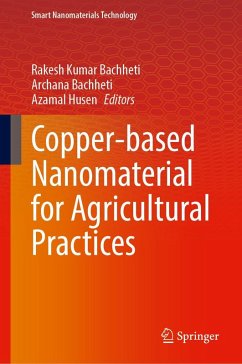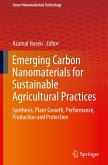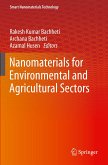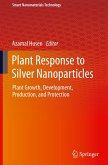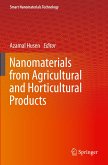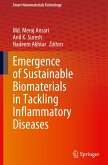Copper-Based Nanomaterial for Agricultural Practices
Herausgegeben:Bachheti, Rakesh Kumar; Bachheti, Archana; Husen, Azamal
Copper-Based Nanomaterial for Agricultural Practices
Herausgegeben:Bachheti, Rakesh Kumar; Bachheti, Archana; Husen, Azamal
- Gebundenes Buch
- Merkliste
- Auf die Merkliste
- Bewerten Bewerten
- Teilen
- Produkt teilen
- Produkterinnerung
- Produkterinnerung
This book provides an in-depth analysis of the latest research on copper-based nanomaterials in agriculture. It explores the properties and characteristics of these materials, along with the methods used for their synthesis and characterization. The book delves into the various applications of copper-based nanomaterials in agricultural practices, assessing both their benefits and challenges. It also addresses concerns about their potential toxicity and environmental impact, offering strategies for minimizing these risks. Additionally, the book discusses the challenges that need to be overcome…mehr
Andere Kunden interessierten sich auch für
![Emerging Carbon Nanomaterials for Sustainable Agricultural Practices Emerging Carbon Nanomaterials for Sustainable Agricultural Practices]() Emerging Carbon Nanomaterials for Sustainable Agricultural Practices191,99 €
Emerging Carbon Nanomaterials for Sustainable Agricultural Practices191,99 €![Carbon Based Nanomaterials for Drug Delivery Carbon Based Nanomaterials for Drug Delivery]() Carbon Based Nanomaterials for Drug Delivery130,99 €
Carbon Based Nanomaterials for Drug Delivery130,99 €![Nanomaterials for Environmental and Agricultural Sectors Nanomaterials for Environmental and Agricultural Sectors]() Nanomaterials for Environmental and Agricultural Sectors129,99 €
Nanomaterials for Environmental and Agricultural Sectors129,99 €![Plant Response to Silver Nanoparticles Plant Response to Silver Nanoparticles]() Plant Response to Silver Nanoparticles129,99 €
Plant Response to Silver Nanoparticles129,99 €![Plant Response to Gold Nanoparticles Plant Response to Gold Nanoparticles]() Plant Response to Gold Nanoparticles129,99 €
Plant Response to Gold Nanoparticles129,99 €![Nanomaterials from Agricultural and Horticultural Products Nanomaterials from Agricultural and Horticultural Products]() Nanomaterials from Agricultural and Horticultural Products136,99 €
Nanomaterials from Agricultural and Horticultural Products136,99 €![Emergence of Sustainable Biomaterials in Tackling Inflammatory Diseases Emergence of Sustainable Biomaterials in Tackling Inflammatory Diseases]() Emergence of Sustainable Biomaterials in Tackling Inflammatory Diseases174,99 €
Emergence of Sustainable Biomaterials in Tackling Inflammatory Diseases174,99 €-
-
-
This book provides an in-depth analysis of the latest research on copper-based nanomaterials in agriculture. It explores the properties and characteristics of these materials, along with the methods used for their synthesis and characterization. The book delves into the various applications of copper-based nanomaterials in agricultural practices, assessing both their benefits and challenges. It also addresses concerns about their potential toxicity and environmental impact, offering strategies for minimizing these risks. Additionally, the book discusses the challenges that need to be overcome to ensure the safe and effective use of copper-based nanomaterials in agriculture. A valuable resource for researchers, academics, and professionals in agriculture and nanotechnology, this book provides a comprehensive and insightful understanding of the subject.
Produktdetails
- Produktdetails
- Smart Nanomaterials Technology
- Verlag: Springer / Springer Nature Singapore / Springer, Berlin
- Artikelnr. des Verlages: 978-981-96-8609-4
- Seitenzahl: 236
- Erscheinungstermin: 2. November 2025
- Englisch
- Abmessung: 241mm x 160mm x 19mm
- Gewicht: 522g
- ISBN-13: 9789819686094
- ISBN-10: 9819686091
- Artikelnr.: 74304943
- Herstellerkennzeichnung
- Springer-Verlag GmbH
- Tiergartenstr. 17
- 69121 Heidelberg
- ProductSafety@springernature.com
- Smart Nanomaterials Technology
- Verlag: Springer / Springer Nature Singapore / Springer, Berlin
- Artikelnr. des Verlages: 978-981-96-8609-4
- Seitenzahl: 236
- Erscheinungstermin: 2. November 2025
- Englisch
- Abmessung: 241mm x 160mm x 19mm
- Gewicht: 522g
- ISBN-13: 9789819686094
- ISBN-10: 9819686091
- Artikelnr.: 74304943
- Herstellerkennzeichnung
- Springer-Verlag GmbH
- Tiergartenstr. 17
- 69121 Heidelberg
- ProductSafety@springernature.com
Rakesh Kumar Bachheti has over {20} years of experience in research and teaching, focusing on natural products for industrial applications, biofuels and bioenergy, green synthesis of nanoparticles, and pulp and paper technology. He has mentored {40} M.Sc. and {7} Ph.D. students and has played a key role in developing curricula for B.Sc., M.Sc., and Ph.D. programs. A distinguished academic, he has authored {160} research publications, edited {8} books, and contributed {40} book chapters with leading publishers such as Springer, Elsevier, Taylor & Francis, and Nova. His outstanding contributions to scientific research and innovation have earned him global recognition, including being listed among the Top {2%} Scientists for {2024} by Stanford University, USA, and Elsevier. Archana Bachheti completed her Ph.D. from the Forest Research Institute, Dehradun, India, in {2006}. Currently, she is a Professor at Graphic Era University in Dehradun, India. With over {20} years of extensive experience, she has served in various academic roles in India and has provided expertise internationally. Her teaching portfolio includes subjects such as ecology and environment, environmental science, freshwater ecology, disaster management, and bryophytes and pteridophytes. Professor Bachheti's research interests span a broad interdisciplinary field of plant ecology, focusing on ecorestoration, green chemistry—particularly the synthesis of nanomaterials—and exploring the medicinal properties of plants. Throughout her career, she has been actively involved in mentoring students and researchers. Dr. Bachheti has published more than {130} research papers and edited over {8} books. She is listed among the Top {2%} Scientists for {2024} by Stanford University, USA, and Elsevier. Azamal Husen worked as a Full Professor and Head of the Department of Biology at the University of Gondar, Ethiopia, and currently serves as a Foreign Delegate at Wolaita Sodo University, Ethiopia. He is also an Adjunct Professor at Graphic Era University, India. Previously, he was a Full Professor at Sankalchand Patel University in India and a Visiting Faculty at the Forest Research Institute and Doon College of Agriculture and Forest in Dehra Dun, India. With 25 years of expertise in Nanobiotechnology, Plant Physiology, Environmental Botany, Medicinal Plants, and Clonal Propagation. He has led research funded by organizations such as the World Bank, the National Agricultural Technology Project, the Indian Council of Agricultural Research, the Indian Council of Forest Research Education, and the Japan Bank for International Cooperation. He has delivered numerous talks at conferences and workshops, led academic staff orientation courses, and developed BSc, MSc, and PhD curricula. He was honored with an award from the University of Gondar for his decade of service in teaching, research, and community work. Husen has published extensively and served on editorial boards of prestigious journals. Acknowledged as one of the "World’s Top 2% Scientists" (2022-2024) by Stanford University, he has also contributed as a Book Series Editor and Journal Guest Editor for several scientific publications in Plant Biology, Medicinal Plants, and Nanotechnology.
Introduction to Copper-Based Nanomaterials in Agriculture.- Synthesis, Properties and Characterization Techniques for Copper-Based Nanomaterials.- Environmental Impacts of Copper-Based Nanomaterials in Agriculture.- Toxicity and Safety Concerns of Copper-Based Nanomaterials in Agriculture.- Synthesis and application of Copper nanofungicides.- Role of Copper nanomaterials for pesticide detection.- Applications of Copper-Based Nanomaterials in Crop Production.- Use of Copper-Based Nanomaterials in Organic Agriculture.- Role of Copper-Based Nanomaterials in Soil Remediation.- Use of Copper-Based Nanomaterials for Nutrient Delivery and Uptake.- Copper-Based Nanomaterials for Enhanced Photosynthesis and Light Harvesting.- Use of Copper-Based Nanomaterials in Seed Germination and Plant Growth.- Copper-Based Nanomaterials for Control of Plant Pathogens and Diseases.- Use of Copper-Based Nanomaterials in Post-Harvest Management.- Copper-Based Nanomaterials in Agricultural Wastewater Treatment.- Use of copper nanomaterials against nematodes.- Effect of Copper-Based Nanomaterials on Soil Microbial Communities.- Copper-Based Nanomaterials for Precision Agriculture and Smart Farming.- Future Prospects of Copper-Based Nanomaterials in Agriculture.
Introduction to Copper-Based Nanomaterials in Agriculture.- Synthesis, Properties and Characterization Techniques for Copper-Based Nanomaterials.- Environmental Impacts of Copper-Based Nanomaterials in Agriculture.- Toxicity and Safety Concerns of Copper-Based Nanomaterials in Agriculture.- Synthesis and application of Copper nanofungicides.- Role of Copper nanomaterials for pesticide detection.- Applications of Copper-Based Nanomaterials in Crop Production.- Use of Copper-Based Nanomaterials in Organic Agriculture.- Role of Copper-Based Nanomaterials in Soil Remediation.- Use of Copper-Based Nanomaterials for Nutrient Delivery and Uptake.- Copper-Based Nanomaterials for Enhanced Photosynthesis and Light Harvesting.- Use of Copper-Based Nanomaterials in Seed Germination and Plant Growth.- Copper-Based Nanomaterials for Control of Plant Pathogens and Diseases.- Use of Copper-Based Nanomaterials in Post-Harvest Management.- Copper-Based Nanomaterials in Agricultural Wastewater Treatment.- Use of copper nanomaterials against nematodes.- Effect of Copper-Based Nanomaterials on Soil Microbial Communities.- Copper-Based Nanomaterials for Precision Agriculture and Smart Farming.- Future Prospects of Copper-Based Nanomaterials in Agriculture.

